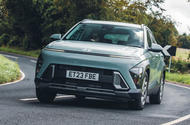
Is entry-level second-generation crossover refreshingly simple or wanting in key areas?
With the rise of crossovers and SUVs, car makers’ model ranges have ballooned very quickly.For every hatchback and saloon, there needed to be a high-riding equivalent. Not only that, but because the tall cars tend to have a slightly bigger footprint as well, gaps started appearing for more crossovers to be stuffed into.Filling them has led to a bit of overlap here and there. The Kona was launched in 2017 as Hyundai’s B-segment crossover – effectively a tall Hyundai i20. Available with petrol, diesel, hybrid and electric powertrains, it’s been quite the success for Hyundai. And then in 2021 came the Hyundai Bayon, which is much the same thing on paper – it’s even the same length to the millimetre. There are differences – the Bayon is a little narrower, a bit cheaper and not quite as tall – but it’s no doubt a rather confusing pair to sit next to each other in the showroom.Now it’s time for the Kona to escape the Bayon’s competition, because the second generation is getting bigger – a lot bigger. It’s 170mm longer, 15mm taller and 60mm wider, putting it neatly between the Bayon and the larger Tucson, and right in the firing line of competitors such as the Volkswagen T-Roc, Honda HR-V, the upcoming Mk2 Toyota CH-R and even slightly bigger cars like the Nissan Qashqai. It gets an eye-catching new design but continues to offer a choice of petrol, hybrid and electric power. In a refreshing break from loaded-to-the-gunwales press cars, Hyundai sent us an entry-level Advance model with the 1.0-litre petrol engine and a manual gearbox. Might less be more?The Range at a GlanceENGINESPOWERPRICE1.0 120PS Advance118bhp£25,7251.6 198PS Ultimate195bhp£31,7251.6 Hybrid Advance139bhp£30,025Electric 48.4kWh154bhp£34,595Electric 65.4kWh215bhp£38,595Transmissions: 6-spd manual*, 7-spd dual-clutch auto (optional on 120PS, 198PS), 6-spd dual-clutch auto (Hybrid), 1-spd reduction gear (Electric)Hyundai offers the Kona with a choice of turbo petrol, hybrid and electric powertrains. The petrols get a manual gearbox as standard, or a dual-clutch automatic as an option.Four trim levels are offered. Advance is the already well-equipped base model. N Line brings slightly more equipment, as well as a sportier bodykit. N Line S and Ultimate add even more options. The sizeable price gap between the two petrol engines is because the 1.6 requires an upgrade to N Line S or Ultimate.
Source: Autocar